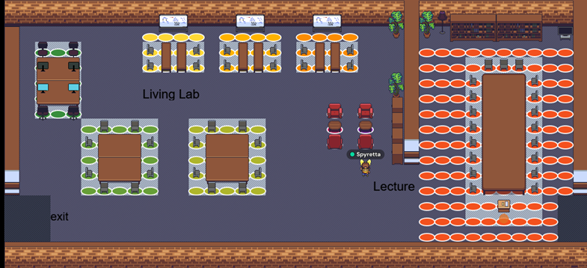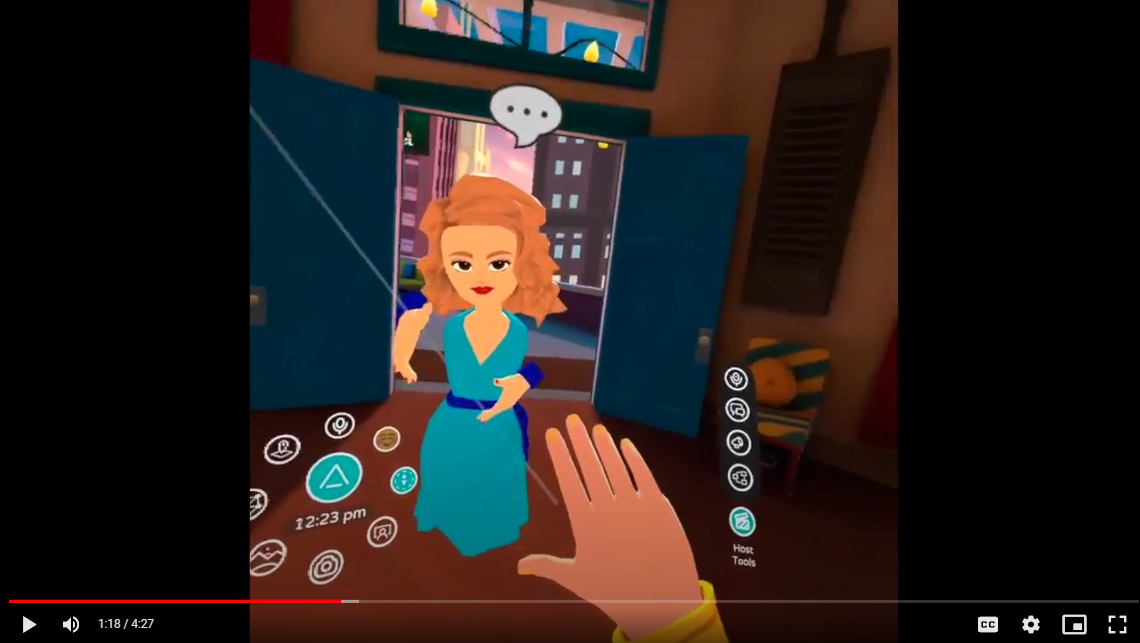East meets West: Exploring language and culture in virtual environments
This VIS-project was part of the course Language and Culture 2: Local Cultures and Global Commodities in the Language, Technology and Culture program of the RUG, faculty Campus Fryslân. The project worked together with the Faculty of Arts of the University of Warsaw. The goal was to get students to work closely together on the diverse themes for the course, such as themes relating to cultural heritage, anthropology, and social sciences.
The “structured openness” of GatherTown gave students and academics, junior and senior alike, the licence to engage and have fun.

Background
The “East meets West” project was an exploratory VIS_project designed to kickstart interaction between students at the University of Warsaw (Faculty of Arts) and the University of Groningen (Faculty Campus Fryslân). Although students from both universities had complementary interests around themes relating to cultural heritage, anthropology, and social sciences, they would normally not have the opportunity to cross paths. Especially considering the mix of undergraduate, graduate, and postgraduate scholars involved across two distant institutions. Our goal was to get them to work closely together on the diverse themes for the course.
By introducing the VIS-project, we wanted to foment discussion and the free exchange of ideas, encapsulating what we believe to be the core tenant of the university experience in an online environment. Concretely, we wanted graduates to inspire undergraduates, novices to come face to face with complex scientific challenges, and we wanted everyone to learn about the groundbreaking research of fieldworkers in locations as diverse as Ukraine, Georgia, Hawaii, and more. In a nutshell, we strived to open up scientific discussion, lower the barrier for cross-cultural, international interaction, and ignite a sense of curiosity and enthusiasm in all those who were involved.
In the VR space, we designed activities including virtual tours of the respective universities and museums, and experimented with virtual team building and bonding.
Design & implementation process
The VIS project was executed in two phases. In the first phase, we designed an experience that involved both synchronous and asynchronous activities in Google Classroom, coupled with live virtual meetings in GatherTown. The activities were highly interactive, requiring extensive information exchange and collaboration in small groups. These involved interviews and treasure hunts, and related to a diverse array of topics, including cultural heritage, anthropological theories of language and culture, and research decolonization. As intermediate and final products for the course, participants worked together in assignments in multiple modalities (text, voice, video), having the space, freedom and encouragement to be as creative as they wished.
In the second phase, we augmented the activities with a Virtual Reality exchange. To those ends, we used Oculus VR headsets, which the Faculty Campus Fryslân shared with the partners at the University of Warsaw. In the VR space, we designed activities including virtual tours of the respective universities and museums, and experimented with virtual team building and bonding. We explored with the participants different VR immersive experiences and had meetings in virtual spaces. We also shared 360° videos and took partners on tours around our hometowns and other places of interest. This second phase was highly experimental, and given the novelty of the VR headset had more of an exploratory scope.
For students for whom the lectures had been augmented with cross-border, collaborative activities in Gathertown, and later, in the VR exchange, there was palpable enthusiasm.

Reflection
The experience of instructors in the VIS project was positive. Having the opportunity to augment their lectures with interactive learning and an array of activities involving new students with different backgrounds invigorated the online classroom experience, and breathed new life into their remote lectures.
For students for whom the lectures had been augmented with cross-border, collaborative activities in Gathertown, and later, in the VR exchange, there was palpable enthusiasm. While our goal was not to gamify the academic experience, allowing students to “play” in an online environment was, in a sense, liberating. Normally, in a Zoom session, the threshold for a student, especially an undergraduate, to press that “raise hand” button is high. They know that once they do that, all eyes will be on them and, as in accordance with our expectations and experiences, this was indeed the case in the online lecture component in which the VIS-project was integrated. However, the situation was very different for the other activities. The “structured openness” of GatherTown gave students and academics, junior and senior alike, the licence to engage and have fun. Exploring both a virtual space, and, thanks to the specifically-designed activities, intellectual space. In this medium, students experimented with communication formats like reels (short videos), podcasts (voice recorded interviews or storytelling ) and stories (short photomontage with interesting content), among others.
As for the use of the VR headsets, the student impressions were very positive. Although there is a learning curve to using the Oculus VR headset, students enthusiastically met the challenge and used the technology first to play together, and later, for content-related interactions. This playful aspect of the use of the Oculus is not something we wish to brush under the carpet — to the contrary, just as an physical exchange has a fun and engaging component, the use of VR approximates a shared leisure activity among the participants and, in so doing, enhances a sense of camaraderie at having shared what for many is an unusual and fun experience. The fact that VR headsets can also be used for virtual meetings, tours, and lectures is an added benefit.
Looking forward
The VIS project had an objective impact on the implementation of pedagogical activities at the hosting institution. This academic year we will continue the use of GatherTown and VR headsets in the same course, but now augmented with more specifically-designed content (including more 360 videos and VR experiences which connect to lecture content, designed to help students feel greater connection to the cultures discussed in the course). We have also learned from this VIS experience how critical it is to integrate VIS activities into the syllabus to ensure more investment not just by the most eager students, but also by those who may need a nudge to invest time in coursework. Specifically, this means making the virtual activities a requirement, not just an extra-curricular, and designing graded assignments around them.
Finally, the East meets West team is also working on a related grant application together.
Reference
More information about the program can be found in the link. Involved staff included:
- Dr Matt Coler, Associate Professor Language & Technology at the University of Groningen, Faculty Campus Fryslân
- Spyretta Leivaditi, Research Assistant at the University of Groningen, Faculty Campus Fryslân
